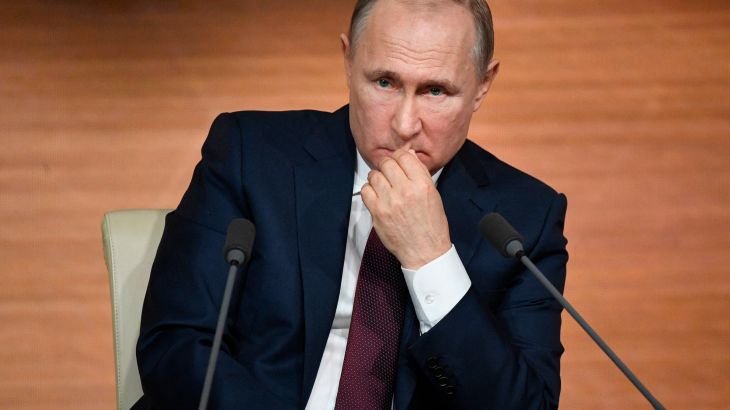Putin cancels annual year-end news conference: Kremlin
The break in tradition comes as Russia’s war in Ukraine falters and its economy struggles under the weight of sanctions.

Russian President Vladimir Putin will not hold a year-end news conference this year, the Kremlin has said, suspending an annual tradition that dates back to the early years of his presidency.
“There will not be [a news conference] before the New Year,” Kremlin spokesman Dmitry Peskov said on Monday, but noted that Putin “regularly speaks to the press, including on foreign visits”.
Keep reading
list of 3 itemsRussia: Putin critic gets 8 years in jail for ‘false information’
Russia could be fighting in Ukraine for a long time: Putin
Peskov gave no reason for not holding the marathon conference that usually lasts several hours, but Kremlin observers view it as a break with protocol due to Russia’s war in Ukraine, which began in February.
There would also be no New Year reception at the Kremlin, officials said, at a time when Russia’s war in Ukraine has not gone according to plan.
Putin, who has been in power since 2000, has held a news conference in December most years of his rule – an event that he has used to gloss over his image on national TV.
During the media gathering, a major political event in the country, Putin dedicates much of the spectacle to answering softball questions from local journalists and the public, allowing his administration to boast about its respect for freedom of expression and transparency in governance.
Last year, he spoke for more than four hours.
This year would mark the first time in a decade that Putin did not hold the December event, which is a rare opportunity for reporters outside the Kremlin pool, including international journalists, to ask the Russian president questions directly.
On February 24, Putin sent troops into Ukraine, and on September 21 he announced a mobilisation to prop up Moscow’s forces there.
Hundreds of thousands fled Russia to avoid being drafted, while outcry grew among ethnic minorities in remote, poor areas in Siberia, where Russia’s armed forces have long recruited disproportionately.
This has isolated Russia in the international arena, as Putin went after local critical voices dissenting over the invasion or the mobilisation itself.
Criticism among Russians has grown as Moscow suffered military setbacks in the war, including the loss of the major southern city of Kherson, which Russia had illegally annexed.
Thousands of Russians have been killed since the invasion in February, an issue mostly ignored on state television. The country’s economy has also been hit hard as global sanctions against various oligarchs, banks and other institutions surged.